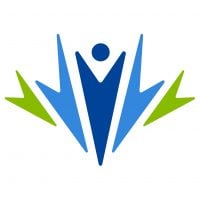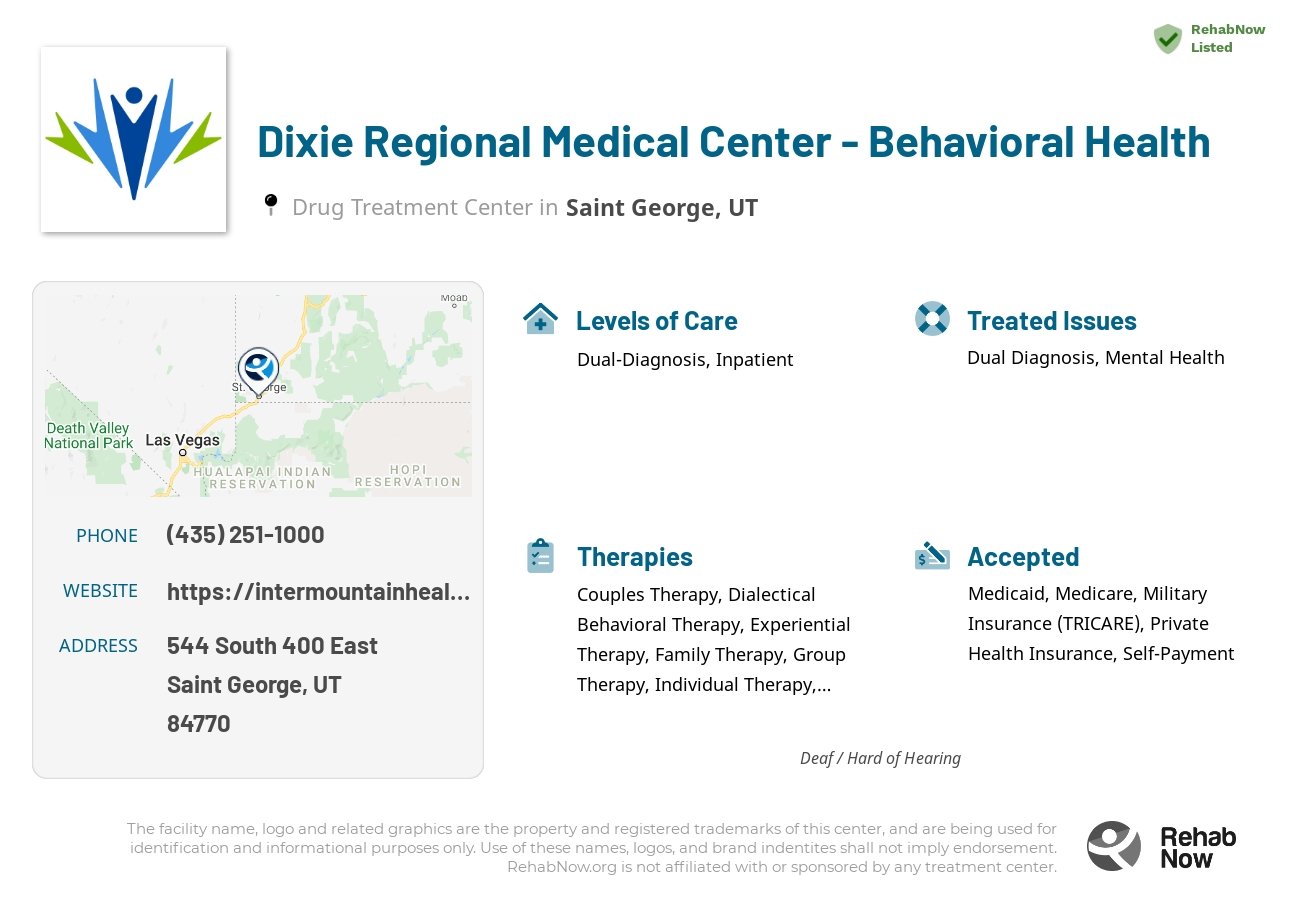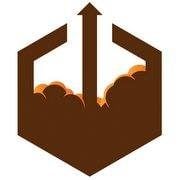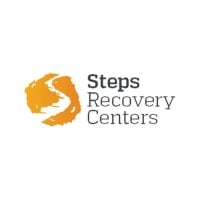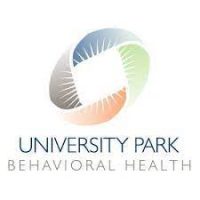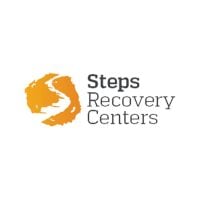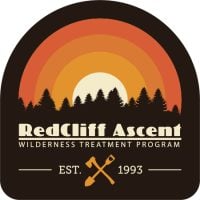Dixie Regional Medical Center - Behavioral Health
Drug Rehab Center in Saint George, Utah
Dixie Regional Medical Center - Behavioral Health in Saint George, Utah is a specialized treatment facility that offers inpatient and outpatient care for individuals struggling with addiction or mental health concerns, providing individualized treatment in a supportive environment and accepting private health insurance, while offering a range of therapies and educational programs.
About Dixie Regional Medical Center - Behavioral Health in Utah
Dixie Regional Medical Center - Behavioral Health in Saint George, Utah is a specialized treatment facility that provides both inpatient and outpatient care for individuals who are struggling with addiction or dual diagnosis mental health concerns. The center is a part of Intermountain Healthcare, the largest and most comprehensive health system in the Intermountain West. Dixie Regional Medical Center - Behavioral Health offers an individualized treatment approach for substance abuse and dual diagnosis in a warm and supportive environment. They accept private health insurance and have a staff of highly-trained and experienced professionals dedicated to helping individuals overcome their addiction and achieve long-term recovery.
At Dixie Regional Medical Center - Behavioral Health, they provide an array of treatments and services that support the recovery process. They offer individual and group therapy, medication-assisted treatment, relapse prevention planning, trauma-informed care, and family counseling in order to help people learn the skills they need to lead a healthier life. In addition, they have a wide range of educational programs to help individuals and families better understand the disease of addiction and its effects. Dixie Regional Medical Center - Behavioral Health is accredited by the Joint Commission and the State of Utah Motor Vehicle Division, assuring the highest quality of care.
Genders
Ages
Modality
Additional
Conditions and Issues Treated
Dual-Diagnosis
A person who struggles with addiction and a mental health condition suffers from a dual diagnosis. This means that they have two issues that must be treated. Taking care of one or the other is tough, and taking care of both cannot be done alone. A patient who receives dual diagnosis treatment in Utah will be given the best chance at becoming sober.Levels of Care Offered
This center offers a variety of custom treatment tailored to individual recovery. Currently available are Dual-Diagnosis, Inpatient, with additional therapies available as listed below.
Inpatient Treatment Program
Inpatient treatment for alcoholism or drug addiction is an option that provides the addict with a supportive environment in which they can stop using. This type of treatment is appropriate for addicts that are most in need of intensive care and supervision. This includes those who were unable to quit on their own, those who need more structure than they can get in outpatient treatment.
Therapies & Programs
Individual Therapy
No single treatment works for all addicts; therefore, the goal of treatment and therapy should be to find what works best for each individual. Some people requiring addiction treatment may only need a few weeks of inpatient care. Others will require long-term residential care. Tolerance and withdrawal levels vary from person to person and thus affect the intensity of the treatment needed.
If an individualized approach to treatment and therapy is not offered, addicts may fail to reap benefits from their efforts. Professionals must customize plans according to their patient’s needs, limitations, and strengths. The goal of all forms of addiction treatment should be for addicts to find healthy ways to cope with their addiction and its underlying causes.
Couples Therapy
Couples therapy for drug addiction is a unique form of therapy that allows family members to work through the emotional issues of their loved one’s addiction together. Family members can support each other while learning how to cope with the addiction and encourage healthy changes.
Accordingly, couples therapy for drug addiction is designed for an addict and their significant other or spouse. The two will work with a therapist to learn how the addiction affects themselves and the relationship and how to break the negative patterns of behavior that may have developed.
Drug addiction can destroy a person’s life, as well as their family and friends. The loss of one’s ability to choose how to live and behave often leads the addict into depression, anger, guilt, and many emotional problems.
Family Counseling
The therapies usually include siblings, children, and parents who are involved in their daily lives. These sessions are vital because they address past issues that may have hampered an addict’s or alcoholic’s recovery and provide support at a crucial time!
One of the most critical aspects of family therapy is helping addicts’ loved ones see their situation in a new light. It’s also one of the most challenging things a family can do when a loved one struggles with addiction or alcoholism.
Group therapy is held in a safe, controlled setting where patients can feel comfortable sharing their struggles and gaining perspective through shared conversations. It takes place in a group rather than one on one to prevent feelings of isolation or being unique in their situation while creating an environment for addicts at Dixie Regional Medical Center - Behavioral Health to develop fellowship, accountability, and support. Group therapy is an important tool in recovery that prevents cravings that prompt a return to active addiction.
This type of therapy involves the use of a variety of therapeutic techniques to help addicts recover from past traumas that might have triggered their substance abuse. During these sessions, therapists will work with the addict to address painful memories and learn how to cope effectively with stressors as they arise.
During these types of sessions, therapists will typically focus on three main goals:
- Identifying and expressing painful emotions associated with past traumas.
- Reducing the effects of stress on an addict’s life by developing more effective coping mechanisms.
- Developing healthy ways of thinking about stressful situations that can help addicts avoid substance abuse issues in the future.
This type of therapy is typically used in conjunction with other types of addiction treatment services. By identifying and dealing with the root cause of addiction, most addicts can overcome their cravings and prevent relapse once they leave rehab.
Many different types of addiction treatment services exist to help addicts safely get sober, but it’s important for recovering individuals to find a therapist or support group that will help them address the root cause of their addiction.
Rational Emotional Behavior Therapy (REBT) is a type of CBT that uses images, thoughts, and behaviors to teach self-help skills to people recovering from addiction. It’s vital because it allows recovering addicts to work through their issues alone while having support available.
REBT is based on the idea that people have many irrational but habitual thought patterns that fuel harmful behaviors and feelings. Learning to identify destructive patterns in oneself can help one replace them with healthier ones.
When you leave a healthy lifestyle behind to live as an addict, your body becomes unbalanced. Nutritional deficiencies gradually creep in, and before you know it, you’re facing severe health problems. For people who are trying to kick their drug addiction, nutrition therapy at Dixie Regional Medical Center - Behavioral Health is a great tool. It helps restore balance to the body, and for many addicts, it represents the first step on the road to recovery.
Patient Experience
Experiential Therapy at Dixie Regional Medical Center - Behavioral Health
Experiential Therapy is used by drug treatment facilities to treat substance abuse. This treatment is clinically proven to help addicts in detoxification by allowing them to release emotions in a safe environment. The treatment process involves addicts painting their feelings and releasing them on a canvas.
One of the most popular forms of experiential therapy is known as LPE – Love, Peace, and Equilibrium. Amy Gumowitz developed this treatment in 1992. By implementing her philosophy of “reality therapy” into the treatment, Gumowitz’s results were outstanding. Once her success was validated by those she had been helping, she decided to open her treatment center. Although Gumowitz passed away in 2007, her contribution to the addiction recovery remains effective, and better yet, it is 100% self-sufficient.
Payment Options Accepted
For specific insurance or payment methods please contact us.
Is your insurance accepted?
Ask an expert, call (888) 674-0062
Intermountain Healthcare Associated Centers
Discover treatment facilities under the same provider.
Learn More About Intermountain Healthcare Centers
Additional Details
Specifics, location, and helpful extra information.
Saint George, Utah 84770 Phone Number(435) 251-1000 Meta DetailsUpdated November 25, 2023
Staff Verified
Dixie Regional Medical Center - Behavioral Health Patient Reviews
There are no reviews yet. Be the first one to write one.
Saint George, Utah Addiction Information
More than 500 people in Utah die each year from the effects of drug abuse and/or addiction. Substance abuse rates in Utah have seen an upward trend for a variety of drugs. Opioids are involved in almost 70% of all drug-related deaths in the state, annually. In 2014, Utah officials created a Good Samaritan Law to protect drug users who report possible overdoses from being prosecuted themselves.
Between 1999 and 2005, there was a 66% jump in the number of people who died from an overdose in Saint George, Utah. In 2012, 5% of Saint George residents had used an illegal drug. According to statistics, there were over 1,500 admissions to rehab centers in the city in 2016. Many facilities in Saint George provide inpatient treatment, outpatient services, medication-assisted therapy, and holistic treatment.
Treatment in Nearby Cities
- Roy, UT (293.0 mi.)
- Herriman, UT (250.4 mi.)
- Ogden, UT (297.9 mi.)
- Green River, UT (227.7 mi.)
- Ephraim, UT (190.1 mi.)
Centers near Dixie Regional Medical Center - Behavioral Health
The facility name, logo and brand are the property and registered trademarks of Dixie Regional Medical Center - Behavioral Health, and are being used for identification and informational purposes only. Use of these names, logos and brands shall not imply endorsement. RehabNow.org is not affiliated with or sponsored by Dixie Regional Medical Center - Behavioral Health.
